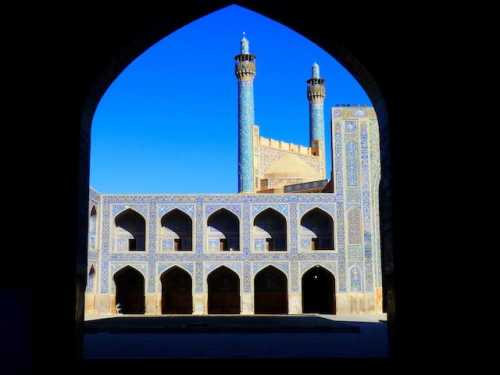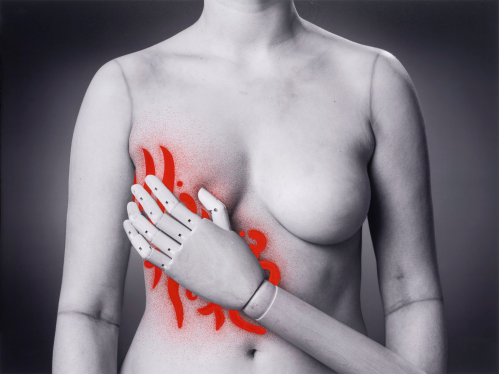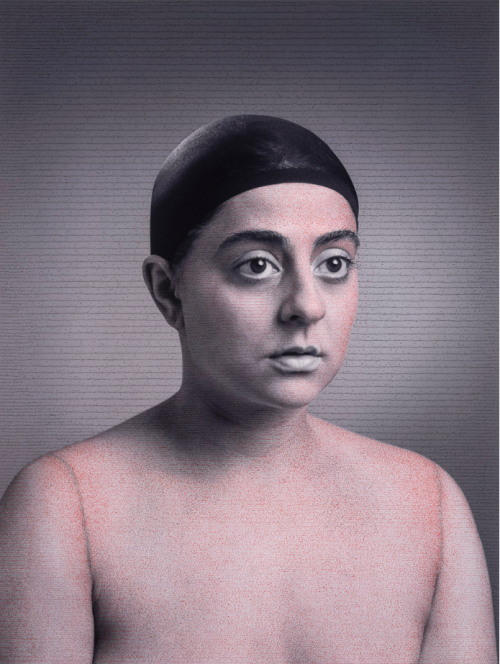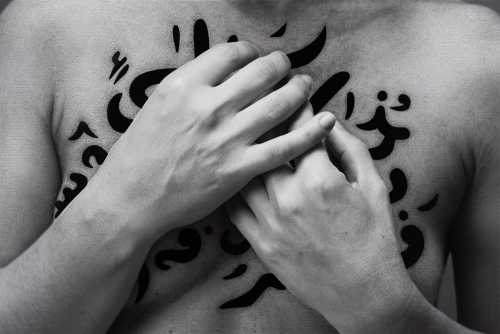- The Last Words 2003
- Photography
- 76 * 40 cm
- Editions: 5
- Edition No. 2
- signed, dated "2003", and numbered edition 2 of 5 (on the verso)
Artwork Description
""""""""I'm really interested in social justice, and if an artist has a certain power of being heard and voicing something important, it's right to do it. It could still be done in such a way that it's not aggressive or overly didactic. I'm trying to find that form"""""""
Shirin Neshat
The Last Word is about the power of a security state and the courage and voice of the artist who creates under the promise of institutional terror. During the 17-minute film — Neshat's first film installation with narrative dialogue — a team of men threaten a woman, urging her to talk about nebulous, perceived misdeeds. (The film is based on the life of Shahrnoush Parsipour, an Iranian novelist who Neshat says was imprisoned four times — once for five years — by the Iranian government. She was never charged with a crime and finally fled Iran for the United States.)
The design of the film is spare: The authoritarian men wear simple white, button-up shirts, the woman wears black. The male protagonist sits at a long table. The woman sits across from him. At the beginning of the film there is one large ledger-book in front of him. During the course of the film, other men pile up other books in front of him. The film begins with the woman walking toward this man. When she arrives, he says, "You've been keeping your distance, but of course we've been kept an eye on you, following your every move," says a middle-age man who serves as some kind of state interrogator.
The woman says nothing.
"Why don't you say something? Are you afraid? What are you afraid of?"he says in a taunting voice.
The woman says nothing.
"I'm not here to harm you, we just have to clear up a few issues," he says, raising a menacing eyebrow at the word 'issues.' "You're the only one who could do that."
She still says nothing.
"Others have given up and confessed," he says. "You can't pretend any more. Not only did you take a wrong turn, you led others too. Don't you feel guilty?"
Nothing from the woman. The man becomes angrier. "I can make you regret being born. But you must know... your situation is very grave... Do you know how much evidence we have against you?"
Not a word.
Finally, partly prompted by her defiance and, apparently, partly by the mere fact that someone of her gender would dare be defiant, he erupts.
"Woman! You've crossed the line. You have written subversive words. Woman! You are guilty of corrupting human minds. Guilty of poisoning human souls." He stands, hovering over her, trying to physically intimidate her. "Your imagination is that of darkness and darkness is the place of the devil and you woman with words full of sin, words full of darkness, words, full of words, full of lust, words full of rage..." And he continues yelling but we can't understand what he's saying.
Finally, the woman responds with poetry. "I come from the land of dolls, from under the shade of paper trees, in a garden of a picture book, from the droughts of barren trials of friendship and love in the dusty streets of innocence from the years when pallid letters of alphabet grew...." She continues, reciting in a chanting melody, as the man and his cohorts stare in stunned silence. At first her voice is first shaky, then it is stronger. Her interrogator falls silent, transfixed, his mouth slightly open. Having staggered the regime with the beauty of her words, the woman walks away.
Neshat's point is clear: Self-expression provides an avenue of freedom, individuality and liberation from whatever confines us. It wins. Insist upon it.
Shirin Neshat
The Last Word is about the power of a security state and the courage and voice of the artist who creates under the promise of institutional terror. During the 17-minute film — Neshat's first film installation with narrative dialogue — a team of men threaten a woman, urging her to talk about nebulous, perceived misdeeds. (The film is based on the life of Shahrnoush Parsipour, an Iranian novelist who Neshat says was imprisoned four times — once for five years — by the Iranian government. She was never charged with a crime and finally fled Iran for the United States.)
The design of the film is spare: The authoritarian men wear simple white, button-up shirts, the woman wears black. The male protagonist sits at a long table. The woman sits across from him. At the beginning of the film there is one large ledger-book in front of him. During the course of the film, other men pile up other books in front of him. The film begins with the woman walking toward this man. When she arrives, he says, "You've been keeping your distance, but of course we've been kept an eye on you, following your every move," says a middle-age man who serves as some kind of state interrogator.
The woman says nothing.
"Why don't you say something? Are you afraid? What are you afraid of?"he says in a taunting voice.
The woman says nothing.
"I'm not here to harm you, we just have to clear up a few issues," he says, raising a menacing eyebrow at the word 'issues.' "You're the only one who could do that."
She still says nothing.
"Others have given up and confessed," he says. "You can't pretend any more. Not only did you take a wrong turn, you led others too. Don't you feel guilty?"
Nothing from the woman. The man becomes angrier. "I can make you regret being born. But you must know... your situation is very grave... Do you know how much evidence we have against you?"
Not a word.
Finally, partly prompted by her defiance and, apparently, partly by the mere fact that someone of her gender would dare be defiant, he erupts.
"Woman! You've crossed the line. You have written subversive words. Woman! You are guilty of corrupting human minds. Guilty of poisoning human souls." He stands, hovering over her, trying to physically intimidate her. "Your imagination is that of darkness and darkness is the place of the devil and you woman with words full of sin, words full of darkness, words, full of words, full of lust, words full of rage..." And he continues yelling but we can't understand what he's saying.
Finally, the woman responds with poetry. "I come from the land of dolls, from under the shade of paper trees, in a garden of a picture book, from the droughts of barren trials of friendship and love in the dusty streets of innocence from the years when pallid letters of alphabet grew...." She continues, reciting in a chanting melody, as the man and his cohorts stare in stunned silence. At first her voice is first shaky, then it is stronger. Her interrogator falls silent, transfixed, his mouth slightly open. Having staggered the regime with the beauty of her words, the woman walks away.
Neshat's point is clear: Self-expression provides an avenue of freedom, individuality and liberation from whatever confines us. It wins. Insist upon it.
Realized Price
25,722 USD
Min Estimate
15,151 USD
Max Estimate
21,818 USD
Average Artwork Worth
+49.467%
Average Growth of Artwork Worth
Sales Performance Against Estimates
Average & Median Sold Lot Value
2021 - 2025
Performance vs. Estimate
2021 - 2025
Sell-through Rate
2021 - 2025
Similar Artworks

Arg-E Rayen IV (from the Shadows and Dust Series)
Estimation
£200
282 USD
-
£300
423 USD
Realized Price
£191
269 USD
23.6%
Sell at
Sale Date
Bonhams
-
9 March 2021

Arg-E Bam II (from the Shadows and Dust series)

The Shah Mosque, Isfahan (from the Inverted Bowl series)



